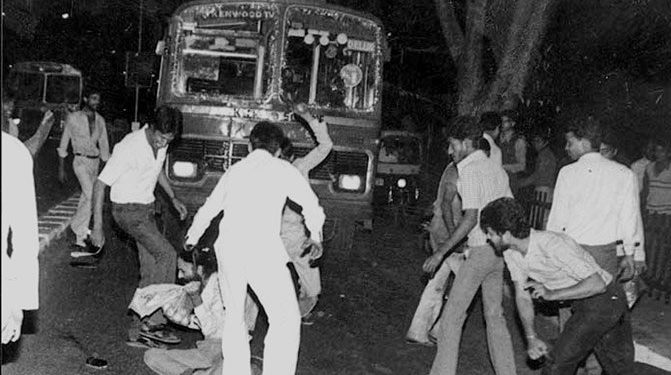Jayakrishna Sahu
The conviction of Congress leader Sajjan Kumar and his sentencing to life in prison by the Delhi High Court for his role in the brutal massacre of Sikhs in the aftermath of the assassination of then Prime Minister Indira Gandhi by her Sikh bodyguards — after a long 34 years — has evoked mixed reactions about our justice delivery system. The bright feature of this judgment is that justice may have been delayed, but has not been denied; it has established that the high and mighty cannot escape the clutches of justice.
However, there is also a dark and pessimistic side to this judgement. Sajjan Kumar has enjoyed his life to the hilt in the 34 years since committing the most horrendous post-Independence ‘genocide’, while the relatives of the victims have gone through an unending saga of trauma and agony, uncertainty and insecurity. There are numerous culprits just as Sajjan Kumar who are roaming scot-free and enjoying their lives and powerful positions, making a mockery of the justice system.
We would only be mocking at the truth, if we call the 1984 tragedy a riot. In a riot, two sides attack and harm each other, but what happened in 1984 was not a riot, but an organised pogrom of Sikhs; it was a mini holocaust. It was never a Hindu-Sikh riot as some people have tried, or continue to try, to paint and project as with an intention to hide the harsh truth.
What happened in 1984 was a series of attacks on the Sikhs by mobs collected, brain-washed, financed, armed and protected by the then party in power and politicians at the helm of nation’s affairs in open collaboration with the administration and law-enforcing agencies of that time. In Delhi alone, 2,800 Sikhs were murdered in a macabre manner, according to official sources. Throughout the country, about 8,000 to 17,000 Sikhs were killed in 40 cities, according to independent sources.
Lamenting that there is no law to punish horrible crimes such as genocide and crimes against humanity, the court advised the government and the Parliament to address this major loophole urgently
There was widespread arson and destruction of houses, gurudwaras and shops, and large-scale abduction, rape and acid-throwing, where the victims were invariably Sikhs.
Responding to such a horrible situation, the then newly appointed Prime Minister Rajiv Gandhi commented: “When a big tree falls, the earth shakes for a while.”
It stunned not only the nation but also the whole world. Instead of condemning such heinous crime against humanity in the strongest of terms and using all the might of the State against this monstrosity, the PM of a civilised and modern democracy was not only painting it as a normal reaction, but also tacitly justifying and encouraging the worst mob-lynching and genocide of a minority community. This was unparalleled in the history of post-Independence India.
Soon after the horrendous happenings, the then prominent human rights organizations of the country PUDR (People’s Union for Democratic Rights) and PUCL (People’s Union for Civil Rights) conducted a joint inquiry into the occurrences, and submitted a report titled “Who are the guilty”, in which they concluded: “The attacks on members of the Sikh Community in Delhi and its suburbs during the period, far from being a spontaneous expression of madness and of popular grief and anger at Mrs Gandhi’s assassination as made out to be by the authorities, were the outcome of a well-organized plan marked by acts of both deliberate commission and omission by important politicians of the Congress(I) at the top and by authorities in the administration.”
In the Sajjan Kumar case, the Delhi High Court Bench comprising Justice S Muralidhar and Vinod Goel has delivered a 207-page judgement, where the Court mentions, “The mass killings of Sikhs in Delhi and elsewhere in November 1984 were in fact crimes against humanity. They will continue to shock the conscience of society for a long time to come.”
Lamenting that there is no law to punish horrible crimes such as genocide and crimes against humanity, the court advised the government and the Parliament to address this major loophole urgently.
The Delhi High Court has pointedly blamed politicians at the helm of affairs, the police and bureaucrats of that time for their active or passive support or patronage to this horrible crime against humanity. The court mentions in its judgement: “The majority of perpetrators of these horrific mass crimes enjoyed political patronage and were aided by an indifferent law enforcement agency. The criminals escaped prosecution and punishment for over two decades.”
The collective conscience of the nation is really shocked about the fact that more than 10,000 Sikhs were systematically and brutally massacred within a week by gangs of criminals with political and administrative protection and patronisation, but our justice system has remained helpless, passive, blind and deaf to these horrible crimes against humanity for decades.
The system took 34 years to send a key culprit such as Sajjan Kumar to prison. Many mob-lynchers of this horrible crime of 1984 are either dead or aged. Those criminals, who are alive, must be mocking and laughing at our feeble and spineless justice system.
The nation feels that a judiciary that is so sensitive to comparatively insignificant issues such as the entry of women into a temple or the height of dahi-handi during Janmastami, the use of eco-friendly crackers and time-limit for their bursting during Diwali, should be more proactive, sincere and serious on matters such as the anti-Sikh pogroms of 1984, which were instigated and abetted by the political heads. The higher judiciary of the country has remained silent and passive although it has been constitutionally bestowed with abundant power to take suo motu cognisance and to initiate action to ensure justice to a victimised people or community.
The writer is an advocate based in Bolangir.






































